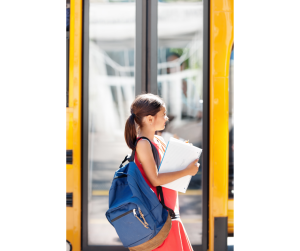Hi moms!
Well, it’s my first written contribution to St. Louis Mom, and I am so excited to be a part of this wonderful organization. Here’s the thing that you’ll learn about me almost immediately: one thing I’m going to do is laugh or insert humor (if you follow me on Instagram, you already know this, LOL). If you want someone to keep it all the way 100 with you while passing along important information about children and teens, you’ve come to the right place. Perhaps I should do an introduction first?
I’m Yasmine Fehr, a psychiatric nurse practitioner specializing in child and adolescent psychiatry. I’m also a one-and-done mama to Samuel (8 months old). When I say my title, there’s a lot of confusion about what I do. I primarily focus on medication management, so I prescribe medications for psychiatric disorders (think ADHD, anxiety, depression, etc).
I’m sure it comes as no surprise that children and teens are experiencing these disorders at a high rate. Because I like to implement a holistic approach, I often incorporate therapeutic approaches and interventions because medication alone is not the answer. I’ve been a psychiatric nurse since 2012 and a nurse practitioner since 2018. So, I have some quality experience. My contributions are definitely going to be centered around things that affect our kids and teens, but I’ll also sprinkle in things that affect us as moms (because we are the captains of the ship, right)? So, today’s topic: back to school (Alexa: play “Back to Life” by Soul II Soul).

Summer is winding down rapidly, and school is around the corner. The stress and anxiety that comes with the return to school is BIG. My workload peaks during the school year. Because school for kids is analogous to work for adults, so this is their primary daily activity and greatest source of stress (also, can we as adults get a summer break? Because we are TIIIIIRED. That’s a petition idea for another day). Primary reasons why school is so stressful:
- Grades, evaluation
- Increased demands on time
- Social pressures and demands
- Behavioral expectations and consequences
- Fear of change and the unknown

We use the word “stress” a LOT in our society, but sometimes I think we relegate the experiences of stress to adults almost automatically. I think the pandemic showed us that EVERYONE experiences stress. There are biological and chemical effects that are triggered by stress in our brains, but I’m not going to get into that part; I’m not trying to take y’all back to school. But know that there are biological processes happening when we experience stress, no matter how old we are.
That said, the effects of stress on kids can manifest as:
- mood changes
- sleep changes
- appetite / diet changes
- physical anxiety symptoms (nondescript headaches and stomachaches)
- complete school refusal
Not only is this stressful for children and teens, but also teachers and, you guessed it, parents. Well, the signs and symptoms have been identified. SO, WHAT CAN WE DO?
- DEAL WITH OUR OWN STRESS FIRST: This is one of my top philosophies when talking with parents about behavioral changes and expectations from their children. How are we as adults modeling what we seek in our children? Modeling good stress management is not only beneficial to us as adults but also for our children, who learn more from our actions than our words.
- Open communication: Encourage your child to share their feelings and concerns about going back to school. Create a safe space for them to express their emotions and listen attentively without judgment. This will help them feel understood and supported.
- Establish a routine: Create a structured daily routine that includes consistent wake-up times, meal times, homework time, and bedtime. Routines provide a sense of security and predictability, which can reduce anxiety.
- Visit the school: If possible, arrange a visit to the school before the academic year begins. Familiarizing your child with the school environment can help alleviate their worries. They can meet their teachers, explore the classrooms, and become more comfortable with the surroundings.
- Organize and prepare together: Involve your child in the back-to-school preparations. Help them organize their school supplies, backpack, and any necessary paperwork. By involving them, you empower them and give them a sense of control over the situation.
- Positive framing: Talk about the positive aspects of going back to school, such as reuniting with friends, engaging in activities they enjoy, and the opportunity to learn new things. Emphasize the exciting aspects of the upcoming school year to create a positive mindset.
- Manage expectations: Address any concerns they may have about academics, friendships, or new responsibilities. By providing accurate information, you can help alleviate their worries and foster a sense of preparedness.
- Encourage self-care: Teach your child the importance of self-care. Encourage them to engage in activities they enjoy, get enough sleep, eat nutritious meals, and engage in physical exercise. These practices contribute to their overall well-being and can help reduce stress.
- Connect with other parents: Reach out to other parents in your child’s class or school. Organize playdates or social gatherings before school starts to help your child reconnect with friends or make new ones. Building these connections can ease their anxiety about socializing.
- Seek professional help if needed: If your child’s stress levels seem excessive or persistent, consider seeking professional help from a counselor or therapist who specializes in working with children.

I highly doubt that any of this is surprising, but there’s nothing like a good list to remind us. We’ve got about a month left of summer before the fall fun begins. We got this, and let’s get SUITED AND BOOTED.










